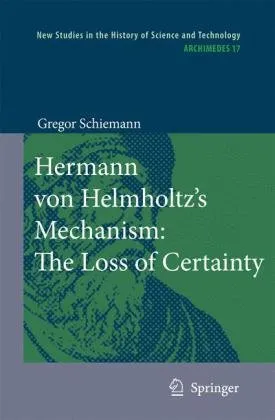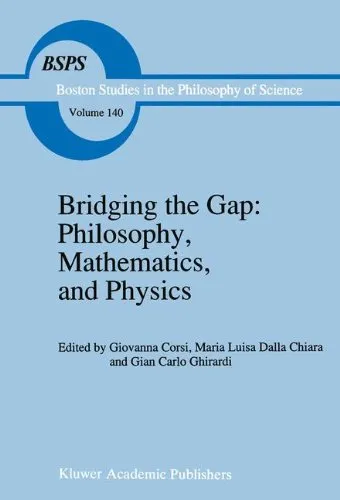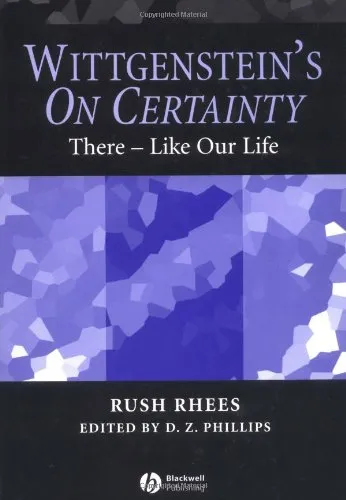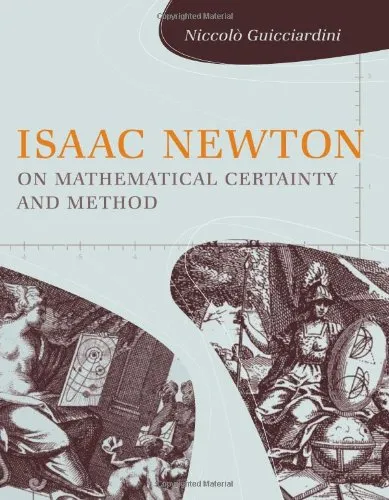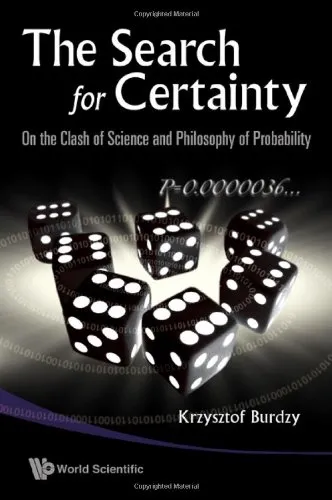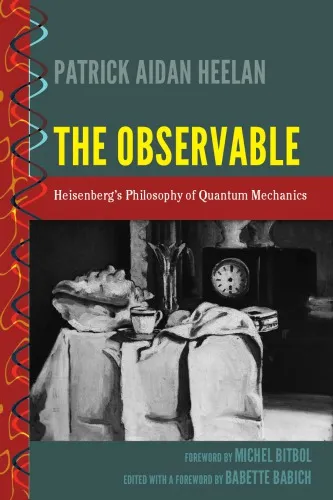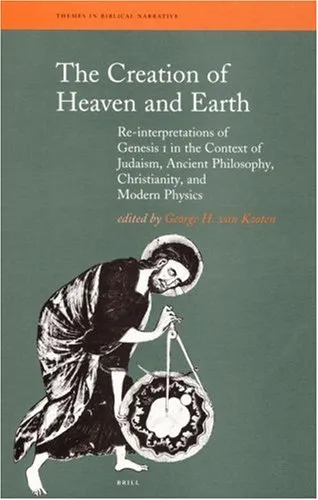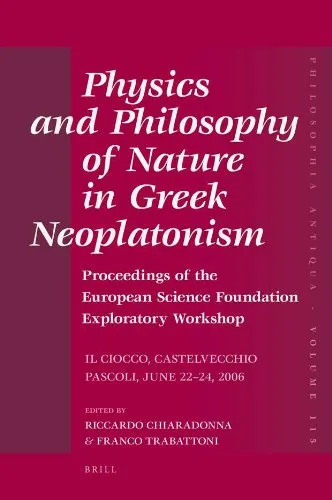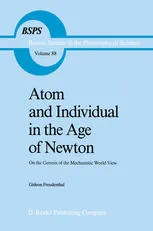Hermann von Helmholtz's Mechanism: The Loss of Certainty: A Study on the Transition from Classical to Modern Philosophy of Nature
4.5
بر اساس نظر کاربران

شما میتونید سوالاتتون در باره کتاب رو از هوش مصنوعیش بعد از ورود بپرسید
هر دانلود یا پرسش از هوش مصنوعی 2 امتیاز لازم دارد، برای بدست آوردن امتیاز رایگان، به صفحه ی راهنمای امتیازات سر بزنید و یک سری کار ارزشمند انجام بدینکتاب های مرتبط:
معرفی کتاب
کتاب 'Hermann von Helmholtz's Mechanism: The Loss of Certainty: A Study on the Transition from Classical to Modern Philosophy of Nature' به قلم گرگور شیمان، به بررسی انتقال از فلسفه طبیعت کلاسیک به مدرن میپردازد. در این کتاب، نویسنده تمرکز ویژهای بر تلاشهای فکری هرمان فون هلمهولتز دارد و به تحلیل نقش مکانیزم و تاثیرات فرهنگی و فلسفی آن در دوران مدرن میپردازد.
خلاصهای دقیق از کتاب
این کتاب به بررسی اندیشههای هرمان فون هلمهولتز، یکی از برجستهترین فیزیکدانان و فلاسفه علمی قرن نوزدهم، میپردازد. هلمهولتز به خاطر تلاشهایش در مکانیزم و تلاشش برای پیوند دادن اصول علمی با نتایج تجربی شناخته شدهاست. شیمان در این اثر، چگونگی تأثیر این دیدگاهها بر فلسفه مدرن طبیعت را بررسی میکند و اینکه چطور مکانیزم هلمهولتز به تزلزل در قطعیتهای قدیمی علمی منجر شد.
شیمان با دقت تغییراتی که در آن زمان در فهم طبیعت و علم پدید آمد را تحلیل میکند، علاوه بر آن چگونه این تغییرات پایههای فلسفی علم را تحت تأثیر قرار داد را شرح میدهد.
نکات کلیدی
- تحلیل عمیق از تاثیرات مکانیزم بر فلسفه طبیعت.
- بررسی تغییرات مهم در درک طبیعت طی انتقال از فلسفه کلاسیک به فلسفه مدرن.
- نقش هرمان فون هلمهولتز در از دست رفتن قطعیتهای سنتی در علم.
جملات معروف از کتاب
"هرمان فون هلمهولتز، چهرهای است که توانست بینش مکانیزم را به دلیلگریهای فلسفی وارد کند و آن را به عنوان یک اصل علمی ضروری به کار گیرد."
"گذار به فلسفه مدرن، فرآیندی بود از بررسی ساختارهای قدیمی که در سایه پیشرفتهای علمی جدید قرار گرفتند."
چرا این کتاب مهم است؟
این کتاب به دلیل تحلیل جامع از تغییرات بنیادی در فلسفه طبیعت و نقش مکانیزم در این تحول، اهمیت بسیاری دارد. شیمان به خوبی نشان میدهد که چگونه دیدگاههای مکانیکی هلمهولتز، چالشهای جدیدی برای فهم ما از علم بوجود آورد.
علاوه بر این، کتاب 'Hermann von Helmholtz's Mechanism' ابزاری ارزشمند برای کسانی است که به مطالعه تحولات تاریخی در علم و فلسفه علاقهمند هستند. این اثر، درک عمیقتری از چگونگی ورود ایدههای مکانیکی به فلسفه مدرن را فراهم میسازد و به خواننده کمک میکند تا ارتباط میان علم و فلسفه را بهتر درک کند.
Explore the depths of scientific philosophy and transition through intellectual history with 'Hermann von Helmholtz's Mechanism: The Loss of Certainty: A Study on the Transition from Classical to Modern Philosophy of Nature'. The book delves into the transformation of thought within the natural sciences and its philosophical implications during the 19th century, mirroring today's scientific challenges.
Summary of the Book
In 'Hermann von Helmholtz's Mechanism: The Loss of Certainty', the work of Hermann von Helmholtz is meticulously examined to showcase a pivotal era in the history of science where certainty, which once characterized classical scientific principles, began to wane. Helmholtz, a versatile scientist and philosopher, is pivotal to understanding this transition. The book explores his endeavors in physics, physiology, and philosophy, shedding light on the crests and troughs of certainty in scientific inquiry.
Helmholtz's role in advancing the sciences was momentous. His work initiated a shift from the deterministic models of classical physics to the probabilistic frameworks that Samuel Schiemann identifies with modern scientific thought. Through a thorough examination of Helmholtz's contributions, particularly in thermodynamics and the speed of nerve signals, the book reveals the changing landscape of the philosophy of nature during his time.
The narrative carefully articulates the gradual erosion of deterministic belief systems, replaced by a nature viewed as contingent and not entirely knowable—ushering in the principles that underpin modern physics theories like quantum mechanics. Helmholtz’s career becomes a microcosm for wider transformations, with chapters addressing pivotal topics like the law of conservation of energy and the philosophical implications of physiological optics.
Key Takeaways
- Hermann von Helmholtz was instrumental in bridging classical determinism with modern science's probabilistic nature.
- The transition from certainty mirrors the broader shift in the philosophy of science, impacting how contemporary science is approached.
- Helmholtz’s interdisciplinary approach highlights the importance of integrating various scientific fields to achieve intellectual progress.
- Understanding the history of scientific philosophy helps contextualize current scientific debates and methodologies.
Famous Quotes from the Book
"The journey from the mechanistic certainties of classical physics to the uncertainties emblematic of modern scientific thought is as much a philosophical voyage as it is a scientific one."
"Helmholtz’s legacy is not just a testament to his discoveries, but a reflection on how we perceive the reliability and scope of scientific knowledge itself."
Why This Book Matters
The significance of 'Hermann von Helmholtz's Mechanism: The Loss of Certainty' lies in its comprehensive analysis of a turning point in scientific thought. This work serves as a crucial resource for historians of science, philosophers, and anyone interested in understanding the evolution of scientific paradigms. As science continues to tackle the uncertainties of quantum mechanics, climate change, and technological advancement, revisiting the shifts of past beliefs becomes imperative. Helmholtz's story is a timeless reminder of the dynamic nature of scientific knowledge and the perpetual search for understanding within an ever-evolving world.
By offering an analytical lens on the philosophical transformations sparked by Helmholtz's work, the book enriches contemporary debates on the nature of science and its role in society, making it essential reading for both academic audiences and general readers fascinated by the intricacies of scientific development.
دانلود رایگان مستقیم
شما میتونید سوالاتتون در باره کتاب رو از هوش مصنوعیش بعد از ورود بپرسید
دسترسی به کتابها از طریق پلتفرمهای قانونی و کتابخانههای عمومی نه تنها از حقوق نویسندگان و ناشران حمایت میکند، بلکه به پایداری فرهنگ کتابخوانی نیز کمک میرساند. پیش از دانلود، لحظهای به بررسی این گزینهها فکر کنید.
این کتاب رو در پلتفرم های دیگه ببینید
WorldCat به شما کمک میکنه تا کتاب ها رو در کتابخانه های سراسر دنیا پیدا کنید
امتیازها، نظرات تخصصی و صحبت ها درباره کتاب را در Goodreads ببینید
کتابهای کمیاب یا دست دوم را در AbeBooks پیدا کنید و بخرید
1413
بازدید4.5
امتیاز0
نظر98%
رضایتنظرات:
4.5
بر اساس 0 نظر کاربران
Questions & Answers
Ask questions about this book or help others by answering
No questions yet. Be the first to ask!
